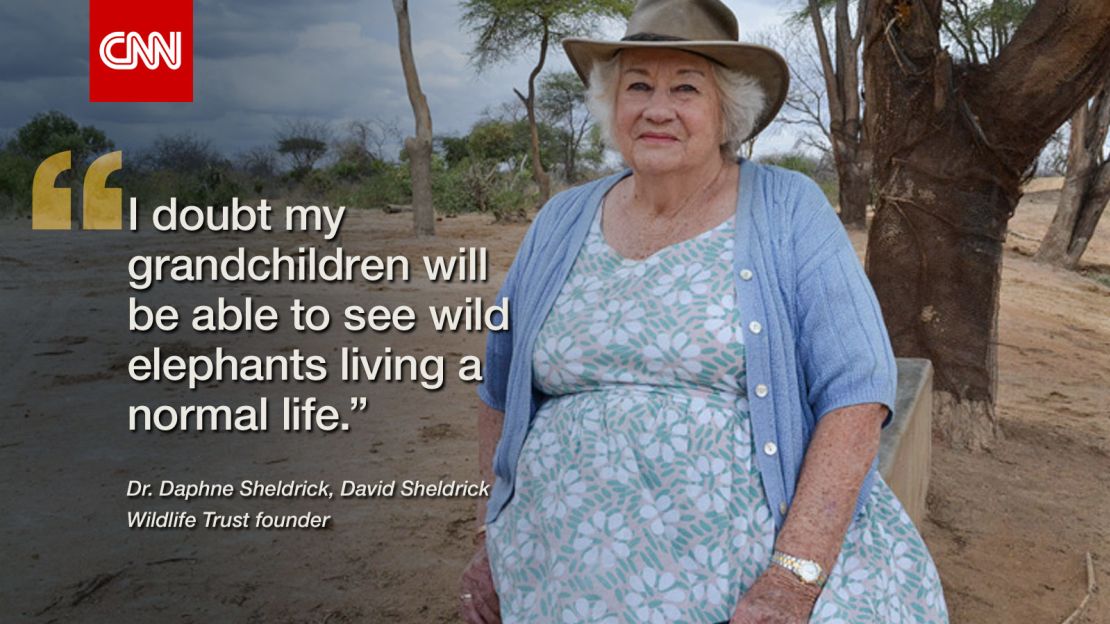For the first two years of life, a baby elephant needs about 42 gallons of its mother’s milk to survive each week. For orphaned elephants that lose their parents to poaching or drought, figuring out how to fulfill his daily necessity is the difference between life or death.
Dame Daphne Sheldrick worked to solve this puzzle for 28 years. With pantry items like baby formula and coconut milk, Sheldrick discovered the right mix to mimic a mother elephant’s milk and changed the fate of elephant populations around the world.
Few orphans survived before Sheldrick got involved. She was the first person in the world to successfully raise newborn elephant orphans, an animal that she saw as almost-human.
Known as the “Mama Elephant” of Kenya, Sheldrick rescued and rehabilitated more than 230 orphaned baby elephants throughout her life.
She died after a long battle with cancer in April.
Follow CNN Africa on social media
Breaking the mold
While stories from the Kenyan wilderness often bring images of tall boots and khaki work suits, Sheldrick broke the mold. Her wardrobe of flowing floral dresses embodied her bright spirit, even while tending to her parade of baby elephants in the wild.
“So many people think a life in Africa is about khaki, and Daphne was always about beautiful, glamorous dresses. In the mud bath with a baby elephant,” Sheldrick’s daughter Angela told CNN while perusing family photos that show a woman unafraid of getting her hands dirty.
Born on a farm in 1934, Sheldrick was educated in Nairobi at the Kenya High School for Girls. She graduated among the top of her class and was offered a medical scholarship, but left schooling behind to marry her first husband.
Daphne’s love led her to Tsavo National Park, where her husband worked as an assistant warden. It’s also where she would meet her second husband, the founding warden of the park, David Sheldrick.?The two were married in 1960.

Together, David and Daphne built Tsavo, carving out 22,000 square kilometers of park from Kenya’s wilderness, forging what is still Kenya’s largest protected area.
When David died in 1977 at only 57 years old, Daphne pressed on. While raising their two daughters, Angela and Jill, she founded the David Sheldrick Wildlife Trust in her husband’s name and fell in love again: this time, with a band of baby elephants.
In a 2013 interview, Sheldrick said that when David died, she thought she’d have a quiet life and maybe write children’s books. “I didn’t really know what I was going to do.? But it just happened upon me.? The orphans started coming. The elephants started coming in.”
Today, 93 elephants live at the sanctuary that Sheldrick worked tirelessly to establish. Each elephant rescued gets five pints of milk every three hours, day and night.
A huge undertaking
As CEO of the wildlife trust, Angela says the orphan project is a “huge” undertaking, but they’ve grown to do much more.
“Without taking care of the bigger picture, [raising elephants] would be futile,” Angela said. “So, we need to know that when these baby elephants go back into the wild, we have the resources in place… to make sure that they’re protected for the future.”
Eleven anti-poaching teams and five veterinary units patrol Tsavo and other protected areas, Angela said. The ultimate goal is for rescued elephants to raise wild-born babies of their own, each helping to rebuild Kenya’s elephant population, she said.
The David Sheldrick Wildlife Trust also visits schools in Kenya to educate and inspire the next generation of conservationists.
“We go to the schools to educate the children,” Edwin Lusichi, the Wildlife Trust’s head caretaker, said. “They need to know why the animals are important… to see and learn more about conservation and wildlife. It’s only these children that will actually make or break the future of the animals.”
Known the world over for her groundbreaking conservation work with Kenya’s wildlife, Dame Daphne Sheldrick’s legacy lives on in the countless projects and citizens she has inspired.
“I don’t really think there’s a baby elephant raised anywhere in the world without some collaborative arrangement with Daphne’s early pioneering work,” her daughter Angela said.
‘A meek and mild lady’
The Reteti Elephant Sanctuary Community United for Elephants (R.E.S.C.U.E.) is one project inspired by Sheldrick. Working in the forests of remote northern Kenya, it’s the first-ever community-owned elephant rescue organization.
R.E.S.C.U.E. co-founder Robert Lemayian said his tribe, the Samburu people, feel a special connection to Sheldrick’s work.
“As a tribe, we’ve always had that relationship with elephants,” Lemayian said. “Many of our elephants have been taken from here, taken to the Sheldricks, and they’ve survived.”
Outreach in schools and sister sanctuaries is an ongoing initiative for the Wildlife Trust. Angela said that were David Sheldrick still alive, he would be proud of his wife and the impact of her work.
“In his lifetime… she was actually a very shy and meek and mild lady,” Angela said. “In the wake of his death, she has emerged as this giant in terms of pursuing his dreams and visions and making so much of his visions for the future a reality,” she said.
With her mother’s passing, Angela knows she needs to do the same.
“I hear her voice, ‘Step up. Get up,’ and you know, ‘Deal with the job,’” Angela said. “That’s what we all have to do.”




